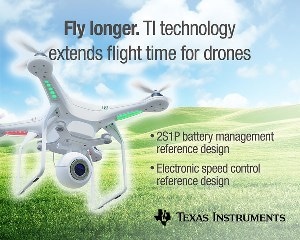Jan 18 2017
 Fly longer. TI adds more flight time to quadcopter drone designs with two new reference designs. (Credit: Texas Instruments)
Fly longer. TI adds more flight time to quadcopter drone designs with two new reference designs. (Credit: Texas Instruments)
Two circuit-based subsystem reference designs were recently launched by Texas Instruments (TI) (NASDAQ: TXN). These designs will enable manufacturers to add flight time and prolong battery life for quadcopters and other industrial and non-military consumer drones used to assist at long distances, provide surveillance or communicate and deliver packages.
Flight time continues to be a top design challenge for recreational quadcopters and professional drones, especially those being used by companies for beyond visual line-of-sight operation. Delivery companies want drones with enhanced battery life, and are testing delivery of parcels with drones to see how far they can go.
Stelios Kotakis, Senior Analyst of Data Transmission & Managed Services, IHS Markit
A recent IHS Markit study highlighted that nearly 50% of drones in the market have a battery life that is estimated to be less than 30 minutes, 35% can fly between 31 and 60 minutes and the remaining 15% and less will be able to fly more than one hour, all under suitable flying conditions without extra payload.
Breakthrough Battery Management Design
A drone's battery pack is transformed into a smart diagnostic black box recorder by TI's 2S1P Battery Management System (BMS) reference design. The remaining capacity is accurately monitored by this recorder, which also protects the Li-Ion battery throughout its entire lifetime.
The drone BMS reference design can be used by designers to add charging, balancing, protection and gauging capabilities to any of the existing drone designs and also enhance flight time. The design helps to leveragethe bq4050 multi-cell Li-Ion gas (fuel) gauge to accurately measure remaining capacity over the entire life of the battery.
It also features a high-efficiency DC/DC converter and the bq24600 battery charge controller in order to achieve high-efficiency power conversion efficiency.
High-Speed Performance for Efficient Motors
The inefficiency of turning a drone's propellers is considered to be another barrier to increased flight time. TI's new reference design ideal for drone electronic speed controllers (ESCs) will allow manufacturers develop drones with extended flight times and increasingly smooth and stable performance.
The Sensorless High-Speed Field Oriented Control Reference Design for Drone Electronic Speed Control enables electronic speed controllers to obtain the highest possible efficiency with performance for speeds beyond 12,000 rpm (> 1.2k Hz electrical) including fast-speed reversal capability for obtaining more stable roll movement.
The design features TI's C2000™ MCU InstaSPIN-FOC™ solution and an F28027F microcontroller for accurate motor control and FAST™ field observer proprietary software algorithm that estimates the speed, rotor flux, torque and angle. The current control bandwidth is tuned by the motor parameter information.
The FAST sensorless observer algorithm, unlike other techniques, is completely self-tuning, and does not require adjustments for accurate operation and propeller control. The design also includes a 60-V LMR16006 SIMPLE SWITCHER® DC/DC converter together with ultra-low quiescent current to efficiently handle lithium polymer (LiPo) batteries of a drone.